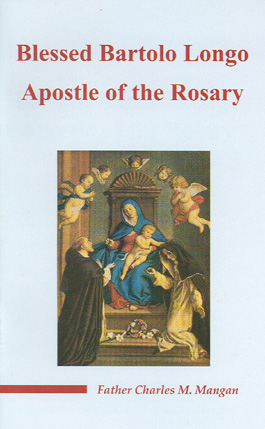
Blessed Bartolo Longo
Blessed Bartolo was raised
in a faithful Catholic family. Unlike most saints, Bartolo spent his misbegotten 20's as a Satanic priest.
Born in 1841, Bartolo Longo lost his
mother when he was only 10. From that time, he grew more and more
distant from his Catholic faith. When he began university studies in
Naples, at the University where St. Thomas Aquinas himself had studied,
he was eager to enter fully into the experience of a secular university.
In mid-19th-century Italy, that meant anti-clericalism, atheism, and ultimately the occult.
Bartolo began attending séances,
experimented with drugs, and even got involved in orgies. He lured
people away from the Catholic faith, publicly ridiculing the Church of
his childhood. Before long, the newly minted lawyer was “ordained” a
priest of Satan. As a Satanic bishop intoned blasphemous words, the
walls of the room shook and disembodied screams terrified those in
attendance.
Because of the influnce of the evil one, Bartolo soon became mired in paranoia and dark visions. Mercilessly driven to madness by the infernal spirits who tormented him night and day Bartolo bgan to desire death over life. Even with these hellish attacks Bartolo clung to his Satanic practices. Thankfully for him his family was relentless in their daily prayers for his deliverance from the enemy.
As with the great Saint Augustine, the
faithful prayers of Bartolo’s family finally tore down the wall of
anger and sin that Bartolo had built around himself. One night, he heard
the voice of his dead father crying out to him, “My dear son return to the one true and Almighty God!”
Shaken, Bartolo visited a friend who
lived nearby, Professor Vincenzo Pepe. When Pepe realized what had
become of Bartolo, he cried, “Are you mad? Do you want to die in an insane asylum and
be damned forever?” Pepe’s courage in
pointing out the self-inflicted mortal danger his friend was in woke Bartolo from his demonic fog. It was only then that he agreed to meet with a Dominican priest,
Fr. Alberto Radente.
Fr. Alberto worked slowly on the young
lawyer, encouraging him to make a thorough confession.
After a month of
stringent moral and spiritual direction, Bartolo was finally absolved and began his work of drawing
people back to Christ. He stood up in the middle of cafés and student
parties and denounced occult practices. He served the poor and
instructed the ignorant; after six years of such work, he pronounced
vows as a lay Dominican, on the feast of Our Lady of the Rosary.
Then, cleansed and consecrated,
Bartolo visited one last séance. He walked in, held up a rosary and
called out, “I renounce spiritualism because it is nothing but a maze of
error and falsehood.”
But for all he had been absolved,
Bartolo, like most of us, struggled with memories of his past. He felt
unworthy of God’s forgiveness, certain that he was impure, permanently
marred by his sin. One day, while collecting rent from the destitute
farmers around Pompeii, Bartolo felt hounded by his former way of life. Privately, to himself Bortolo despaired...
“Despite my repentance, I thought: I
am still consecrated to Satan, and I am still his slave and property as
he awaits me in Hell. As I pondered over my condition, I experienced a
deep sense of despair and almost committed suicide.”
In that moment, Bartolo was reminded of the simple and pure
rosary of his childhood. He was reminded of the love of the Blessed Mother. He
felt Our Lady tell him that his path to heaven was through teaching
others to pray the Rosary.

Bartolo moved to Pompeii, where he
began Rosary groups, organized Marian processions, and began work on a
shrine to Our Lady of the Rosary. His work was funded by the Countess di
Fusco, with whom he worked so closely that rumors began to spread about
the nature of their relationship. Though Bartolo had taken a private
vow of chastity, he was encouraged by Pope Leo XIII to marry the
countess for the sake of the work; the two entered into a celibate
marriage and continued to serve the poor.
For more than 50 years, Bartolo
preached the Rosary, founded schools for the poor, established
orphanages for the children of criminals, and transformed a city of
death to a city dedicated to the living Mother of God. At his
beatification, St. John Paul II, himself perhaps the most Marian pope
since St. Peter, proclaimed Blessed Bartolo Longo “a Man of Mary.”
Blessed Bartolo Longo was a vile, degenerate, blasphemous Satanic priest. But this is his legacy: blessed, soon canonized.
On October 5, his feast day, let’s ask
Bartolo's intercession for all those who think they’re beyond hope, or that
their purity can never be restored and their lives never be made whole,
or that they’ve lost their chance at holiness.
May they join the ranks of murderers,
addicts, and Satanists whose halos shine undimmed around the throne of
the unblemished Lamb of God. Blessed Bartolo Longo, pray for us.

ada yang penasaran dengan sabung ayam toraja
ReplyDeleteFreebet tanpa deposit hanya ada di ANAPOKER
ReplyDeleteAgen judi online terbaik dan terpercaya 128AGENS
ReplyDeleteAgen Sportbook Terpercaya AGENS128
ReplyDelete